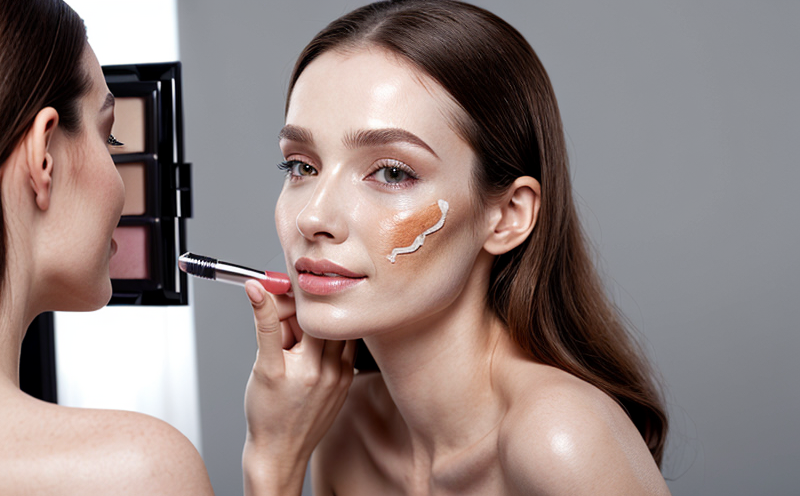Clinical Wrinkle Reduction Testing in Anti-Wrinkle Creams
Testing anti-wrinkle creams for their efficacy is a crucial step in ensuring that cosmetic products meet the high standards expected by consumers and regulatory bodies. This process involves rigorous clinical trials to assess how well the product reduces wrinkles, enhances skin elasticity, and improves overall skin texture. The procedure typically follows a structured protocol aimed at providing reliable data on the product's performance.
The testing begins with selecting an appropriate group of participants who are representative of the target demographic for the anti-wrinkle cream. These individuals undergo baseline measurements using various non-invasive techniques such as dermatoscopy and photography to capture initial skin conditions. Participants then apply the test cream twice daily according to prescribed instructions over a specific period, which can vary from two weeks to six months depending on the severity of wrinkles being addressed.
During this time, regular follow-up sessions are scheduled for additional assessments using similar methods as at baseline. This allows researchers to monitor changes in wrinkle depth, skin elasticity, and other relevant parameters over time. The data collected during these visits is meticulously recorded and analyzed to determine the efficacy of the cream. For instance, improvements in fine lines around the eyes or deeper crow's feet could indicate successful wrinkle reduction.
The choice of test subjects plays a significant role in the accuracy of clinical results since different people have varying skin types, ages, and genetic predispositions towards wrinkling. Therefore, choosing a diverse group ensures that findings are generalizable across various populations. Additionally, it is important to consider ethical considerations when conducting such studies; participants must provide informed consent before participating.
Once all data has been gathered, statistical analysis is performed to quantify any observed changes in skin appearance. Graphical representations like graphs showing improvement over time or comparisons between treated and untreated areas can help visualize these results more clearly. These visual aids are particularly useful when presenting findings to stakeholders such as investors or regulatory agencies.
Accurate reporting of test outcomes is vital for several reasons; firstly, it allows manufacturers to communicate effectively about the benefits offered by their products. Secondly, accurate reports enable healthcare professionals to make informed decisions regarding treatment options available to patients seeking solutions for age-related skin concerns.
- Data Integrity: Ensuring that all collected data is accurate and reliable contributes significantly to the credibility of the test results.
- Statistical Significance: Statistical tests are used to determine whether observed differences between groups can be attributed to the treatment rather than random variation.
- Ethical Considerations: Participants must understand fully what participation entails and consent freely without any coercion or manipulation.
In conclusion, thorough clinical wrinkle reduction testing in anti-wrinkle creams provides valuable insights into a product's effectiveness. By following stringent protocols and analyzing data rigorously, manufacturers can develop high-quality products that deliver noticeable improvements in skin health.
Why It Matters
Conducting clinical trials for wrinkle reduction is essential because it helps ensure the safety and efficacy of anti-wrinkle creams. Regulatory bodies require this data to approve new cosmetic products, making it a mandatory step in bringing innovative skincare solutions to market. Consumers also benefit from these tests by knowing they are purchasing safe and effective products.
Moreover, understanding which ingredients work best under different conditions allows companies to refine their formulas continuously. This iterative process helps improve product performance over time while maintaining consumer satisfaction levels high enough to drive repeat purchases and loyalty programs.
Lastly, regulatory compliance is another critical reason for conducting these trials. Non-compliance can lead to severe penalties including fines or even suspension of business operations. Thus, investing in thorough testing ensures continued adherence to all relevant laws and regulations.
Eurolab Advantages
At Eurolab, we specialize in providing comprehensive cosmetic testing services tailored specifically for the dermatological and clinical efficacy sectors. Our team comprises experienced professionals who understand both the science behind effective skincare products and the regulatory requirements necessary to bring them successfully to market.
We utilize advanced equipment and methodologies that adhere strictly to international standards like ISO 15194:2016, ensuring accurate results every time. By leveraging state-of-the-art technology coupled with meticulous attention to detail, Eurolab consistently delivers reliable data for our clients.
Our commitment extends beyond just executing tests; we also offer valuable insights and recommendations based on our findings. This approach ensures that not only do we meet regulatory requirements but also contribute positively towards advancing the field of cosmetic science.
Quality and Reliability Assurance
To ensure the highest standards of quality and reliability in our testing processes, Eurolab adheres strictly to international norms such as ISO 15194:2016. These guidelines provide a framework for conducting reliable tests that yield consistent results.
Our commitment extends beyond mere compliance; we go above and beyond to maintain excellence throughout every stage of the testing process—from initial consultation through final reporting. This includes using cutting-edge technology, employing highly trained personnel, and maintaining strict quality control measures at all times.
The reliability of our tests is further enhanced by rigorous validation procedures that confirm the accuracy and precision of each measurement tool used during trials. Regular calibration checks ensure that instruments remain accurate over extended periods, thereby enhancing confidence in test outcomes.





